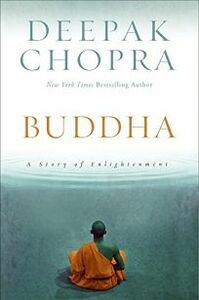You need to sign in or sign up before continuing.
Take a photo of a barcode or cover
hopeful
reflective
medium-paced
Plot or Character Driven:
Character
Strong character development:
Yes
Loveable characters:
Yes
Diverse cast of characters:
Yes
Flaws of characters a main focus:
Yes
hopeful
fast-paced
Plot or Character Driven:
Character
Strong character development:
Yes
Loveable characters:
Yes
Diverse cast of characters:
Yes
Flaws of characters a main focus:
No
reflective
medium-paced
Plot or Character Driven:
Character
Strong character development:
Yes
Loveable characters:
N/A
Diverse cast of characters:
No
Flaws of characters a main focus:
Yes
an interesting read, but definitely less non-fictional than i initially expected. it goes through buddha’s journey to becoming buddha rather than talking about buddhism more objectively (so to speak), which was more of what i was looking for.
Incredible book ~ couldn't put it down.
From the last paragraph:
"The fire of passion burns out eventually. Then you dig through the ashes and discover a gem. You pick it up; you look at it with disbelief. The gem was inside you all the time. It is yours to keep forever. It is buddha." ~ Buddha
Chopra goes on to say in the Epilogue a very defining (yet not-defining!) statement about Buddhism which intrigued me:
Buddhism survives today and thrives all around the world because it is so open-ended. You don't have to obey a set of rules or worship God or the gods. You don't even have to be spiritual. All you have to do is look into yourself and yearn to become clear, to wake up and be complete. . .
This book read like a great novel ~ I never wanted it to end! He took you through the first 40 years of Buddha's life and Buddha lived for another 40! I hope there is a sequel . . . :)
From the last paragraph:
"The fire of passion burns out eventually. Then you dig through the ashes and discover a gem. You pick it up; you look at it with disbelief. The gem was inside you all the time. It is yours to keep forever. It is buddha." ~ Buddha
Chopra goes on to say in the Epilogue a very defining (yet not-defining!) statement about Buddhism which intrigued me:
Buddhism survives today and thrives all around the world because it is so open-ended. You don't have to obey a set of rules or worship God or the gods. You don't even have to be spiritual. All you have to do is look into yourself and yearn to become clear, to wake up and be complete. . .
This book read like a great novel ~ I never wanted it to end! He took you through the first 40 years of Buddha's life and Buddha lived for another 40! I hope there is a sequel . . . :)
This is a fictionalized history of Buddha's life - from Prince Siddhartha, to monk Gautama, to Buddha. There is even a Practical Guide to Buddhism at the end of the book that is very interesting. Whenever I read inspirational books such as this one, I always come away with the feeling that it contains a beautiful message and wouldn't it be a wonderful world if everyone followed and lived by these teachings. However, it is difficult to relate these ideas to our modern, hectic life and you would be run over if you tried to. It just doesn't transfer to the reality of our lives today. I'll probably reread the informational sections at the back of the book someday.
If you want to read a novel about Siddhartha Gautama, the historic Buddha, please read Old Path, White Clouds by Thich Nhat Hanh. (I could also recommend my book Every Day is Magical: A Buddhist Pilgrimage in India and Nepal, but that would be shameless self-promotion.)
(Oddly, many Goodreads reviewers apparently think that Herman Hesse's novel Siddhartha is about the historic Buddha, but it isn’t; it's the spiritual journey of a guy who shares his first name.)
Before I started reading this book for a discussion group, I assumed it would be a good introduction to Buddhism and the Buddha's life, a good book to get new people to join the Buddhist book discussion group. Not so much.
I sense that the author doesn’t understand Buddhism. It sounds like he’s writing about Shaivite Hinduism, not Buddhism. (Chopra is Indian and probably grew up with Hinduism, but writing a book like this requires research.) Before I read the scene under the papal tree, it seemed like he didn't even try to get the Buddha's Enlightenment right, placing it too early—while he's starving himself—rather than after he meets Sujata and figures out the Middle Way. Maybe that was supposed to be when he reaches one of the jhanas, but the book makes it sound like he reached Enlightenment at this stage. Confusing and disappointing. The book does finally show him reach another stage under the tree. Still no mention of the Middle Way.
Of all things to change in the Buddha's life, that was a terrible choice. The Middle Way is a major part of Buddhism. Maybe some Hindus still believe you can reach Enlightenment by practicing extreme austerity to the point that you nearly starve to death, but not so Buddhists.
I like how he described mystical experiences. I also found it interesting how he turned Mara into a major character; usually you only read about his attempts to distract the Buddha from Enlightenment under the bodhi tree.
But… it took a sick and twisted misogynistic mind to come up with this version of the Buddha's life.
No, Devadatta didn’t rape and murder Sujata. What sort of sicko would make up that?! I nearly threw the book across the room and gave it one star on Goodreads without finishing it, but I was reading it for a discussion group.
Sujata met the Buddha when he was practicing such extreme austeries that he nearly starved to death, and she saved him by feeding him kheer, so he came up with the Middle Way.
Now that I've finished reading this book: The real Sujata (who, by the way, has an ancient stupa dedicated to her) does appear in this book. But he portrays her as a sixteen-year-old about to get married rather than a child, and just to make sure we know Chopra thinks women are objects, he shows Siddhartha commenting on her beauty (allegedly to show that he’s aware of her beauty but doesn’t feel lust, but it's douchely done).
Still, Chopra made up an additional character named Sujata... to have Devadutta rape and murder her to further Siddhartha's life plot… even though his path would have been the same without this. NOT okay. V. S. Schwab recently on Twitter vented about this tired and misogynistic plot point of killing off a woman for a male character’s story. Since the 2016 election, it’s hit home that most men don’t see women as fully human; Chopra’s writing reveals this attitude.
He skips over Siddhartha’s married life, rather than showing Yasodhara as a three-dimensional individual, and just shows shallow snippets in flashbacks. Apparently, he doesn’t know how to write anyone female as a three-dimensional character. I realize he normally writes nonfiction, but… he has no trouble writing male characters as three-dimensional.
I recently attended a writers’ conference in which an author talked about “the violence of writing about someone from history.” In this book, it’s literally violence.
I’ll write a story involving a magical cliff. Every single author who has had a female character raped and/or murdered to further the life story of a male character... is drawn to the cliff and falls off it.
I'll also write a fairy tale in which all misogynists are banished from the queendom (since Chopra’s novel involves the Buddha’s father being a psychopath or at least an overtly misogynistic narcissist who banishes all ugly women from his kingdom).
Misogynists continue to be rewarded for writing fiction in which they have no empathy for female characters. I was sick of this before picking up this book.
Context about my review: I know little about Buddhism! Interesting fictionalized account of Guatama Buddha's life. I found sections about enlightenment to be mind bending and re read passages several times. I also enjoyed the Q&A at the end. Different from Siddhartha by Hermann Hesse, another book I enjoyed.
Despite not always being a coherent nor exceptionally written story, this book serves as a great introduction into Buddhism
It shook me, for real. You get wrapped around in all of his words and suddenly you're detached. Listening to the audiobook is such a freeing experience. Unfortunately, it took me so long to finish this. His tale as a prince didn't appeal to me as much as the 3rd part. Despite this, thinking feels different now. My mind feels light.
"Through the eyes of Buddha, the root of suffering is illusion, and the only way out of illusion is to stop believing in the separate self and the world that supports the separate self. No spiritual message has ever been so radical. None remains so terribly urgent." quote from page 221.




